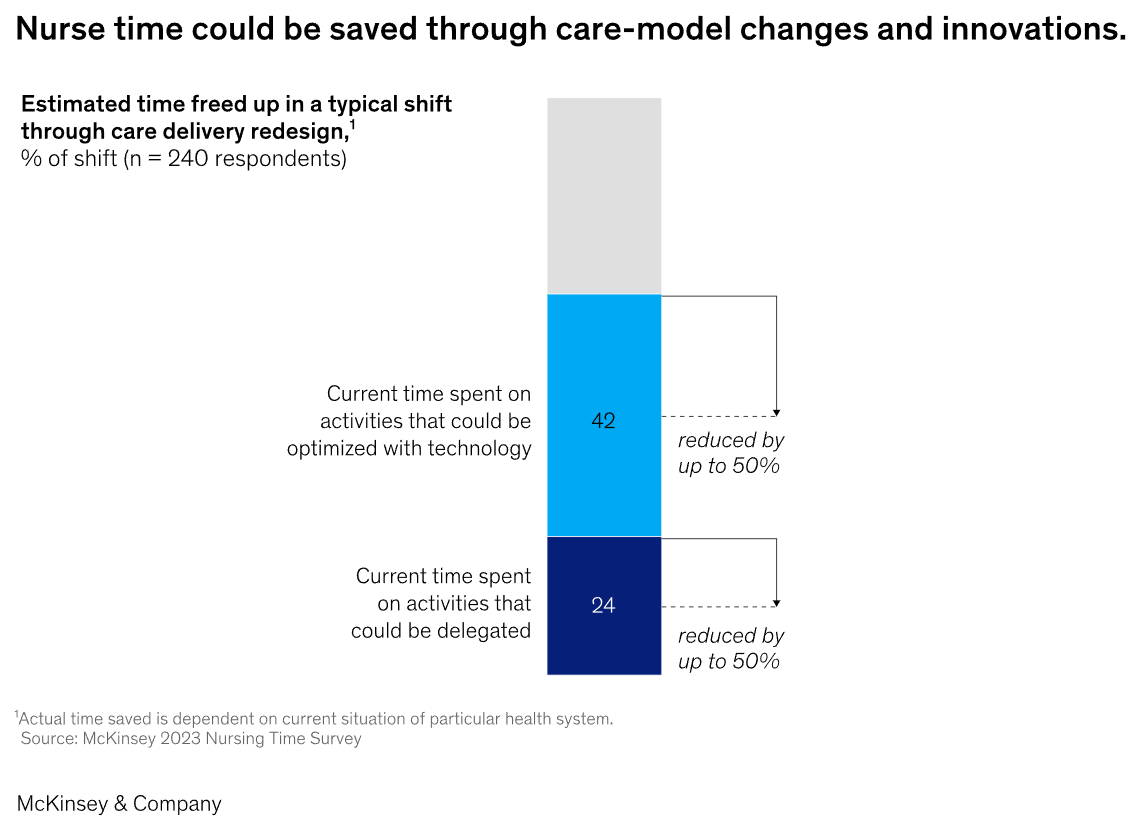AI in Healthcare – news picked by GLI /01
Welcome to “AI in Healthcare – news picked by GLI,” a series of thought-provoking posts that delve into the latest advancements and trends at the intersection of artificial intelligence and healthcare. In this series, we hope to give you a carefully chosen mix of news and insights, handpicked by the Graylight Imaging (GLI) team.
The potential of artificial intelligence to change the way healthcare is provided is the subject of much discussion. But where AI in healthcare is truly making a difference now?
Artificial Intelligence in healthcare: how much does it cost
One of the latest McKinsey & Company reports [1] on the nursing shortage in the United States emphasizes significant workload due to documentation tasks, which consume approximately 15 percent of nurses’ shifts. However, without practical and effective alternatives such as device integration, reduced documentation requirements, and the assistance of AI in documentation, it seems unlikely that the burden of documentation on nurses can be completely relieved. Adoption of artificial intelligence in healthcare in real practice seems to be a real deal not only when it comes to nurses.
Earlier this month, the British Secretary of State for Science, Innovation and Technology announced an investment of £54 million [2] to support the UK’s AI and data science workforce and create reliable and secure AI. But this is not the end of the UK investing in AI – especially AI in Healthcare. The Health and Social Care Secretary has announced a new fund of £21 million [3], aimed at providing NHS staff with advanced artificial intelligence (AI) technology. This investment will enable healthcare professionals to diagnose and treat patients more efficiently, leveraging the latest AI advancements.

Bringing AI to healthcare and medical imaging
Because AI-enabled medical imaging analysis lies at the heart of what we do, we must include information about it here.
According to a recent study [4] by German scientists that was published in the journal eLife, social isolation can cause cognitive decline, which can be detected by MRI scans. The Lubben Social Network Scale was used to measure levels of social isolation in this study, which included 1,409 participants at a six-year follow-up and 1,992 cognitively healthy adults at baseline. The results showed that people who reported social isolation had smaller hippocampus volumes and lessened cortical thickness on MRI scans. Additionally, they reported worsened memory, processing speed, and executive function. It’s amazing that, thanks to science and artificial intelligence, we can observe in such a precise way the neurological consequences of prolonged isolation caused by age but also during times of crisis such as the pandemic. Now the move is on our side to counteract these effects.
Artificial intelligence – a dose of science at the very end
Last but not least – our Machine Learning Team has been actively exploring the newest scientific papers. Recently the article “Modelling The Hemodynamics of Coronary Ischemia” [5] caught their attention. The authors develop and validate a framework for assessing the effects of ischaemia (lack of blood flow) in individuals using patient data from procedures like percutaneous intervention. They analyze the data using a variety of mathematical models and protocols, paying particular attention to the heart’s chambers, circulation, and coronary arteries. A model that accurately depicts the physiological states is created by incorporating basic concepts of cardiac energetics and specific coronary flow parameters. The authors demonstrate a strong correlation between the model and patient data and use supportive results for their protocols to support their approach. Ultimately, they propose that their model can be used to evaluate the individual effects of coronary artery disease using clinical data.
// Stay tuned for our upcoming artificial intelligence in healthcare posts and prepare to be inspired by the incredible possibilities that AI brings to the world of medicine.
References:
[1] Reimagining the nursing workload: Finding time to close the workforce gap, Report by Gretchen Berlin, Ani Bilazarian, Joyce Chang, and Stephanie Hammer, McKinsey & Company, https://www.mckinsey.com/industries/healthcare/our-insights/reimagining-the-nursing-workload-finding-time-to-close-the-workforce-gap
[2] https://www.gov.uk/government/news/54-million-boost-to-develop-secure-and-trustworthy-ai-research
[3] https://www.gov.uk/government/news/21-million-to-roll-out-artificial-intelligence-across-the-nhs
[4] MRI shows how social isolation can lead to cognitive decline. By Kate Madden Yee, AuntMinnie.com, https://www.auntminnie.com/index.aspx?sec=sup&sub=mri&pag=dis&ItemID=140477
[5] Baraikan, A.A.; Czechowicz, K.; Morris, P.D.; Halliday, I.; Gosling, R.C.; Gunn, J.P.; Narracott, A.J.; Williams, G.; Garg, P.; Malawski, M.; et al. Modelling The Hemodynamics of Coronary Ischemia. Fluids 2023, 8, 159. https://doi.org/10.3390/fluids8050159